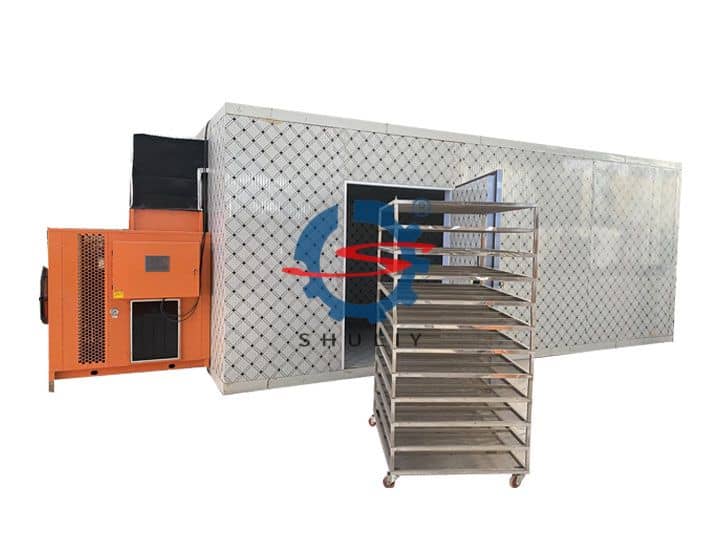木炭干燥机:优质煤球的必备部件
木炭块由于其可再生性、低成本和环保特性,成为传统燃料的日益流行和可持续的替代品。然而,要生产出高质量的煤球,原料必须经过碳化、破碎、干燥等一系列工序。其中,干燥阶段至关重要,因为它会显着影响煤球的性能、处理、储存和燃烧。木炭烘干机是一种专门用于去除木炭中的水分,提高木炭质量和效率的专用设备。在本文中,我们将探讨木炭干燥机的优点、特点和类型。

木炭烘干机的优点
木炭压块干燥机为压块生产过程提供了多个好处,例如:
更快且更高效的干燥:传统的空气干燥方法可能需要几天甚至几周的时间,这取决于环境条件,并导致湿度水平不稳定且不一致。相比之下,干燥机能够快速且可靠地去除压块中的水分,通常在几个小时内实现,提供一致和最佳的干燥条件。
改善压块质量:压块中的水分可能导致多个问题,例如热量输出降低、燃烧不完全、燃烧不均匀、冒烟和异味。此外,过多的水分可能影响压块的一致性,使其在搬运、存储和运输过程中容易破碎。此外,水分还可能促进真菌和细菌的生长,导致变质和质量下降。因此,使用干燥机可以将水分含量降低到安全和最佳水平,从而改善压块的质量、性能和耐用性。
成本效益高且可持续:使用干燥机可以降低劳动力成本并提高生产力,因为该设备可以持续和自动运行,无需人工干预。此外,干燥机可以利用多种能源来源,如木材、煤、气或石油,使其成为灵活且可持续的选择。
木炭烘干机特点
木炭干燥机通常由以下部件组成:
干燥室:干燥室或鼓是装载压块并进行干燥过程的地方。干燥室的大小、形状和材料可以根据机器的容量、设计和应用而有所不同。
热源:热源产生热空气或气体,在干燥室内循环并去除压块中的水分。热源可以是燃烧器、锅炉、炉子或任何其他类型的加热设备,这些设备燃烧木材、煤、气或石油等燃料。
风扇或鼓风机:风扇或鼓风机在干燥室内循环热空气或气体,形成对流,增强干燥效率和均匀性。
托盘或架子:托盘或架子承载压块,使其最大程度地暴露于热空气或气体中。托盘或架子可以由金属、木材或任何其他合适的材料制成,具体取决于机器的设计。
温度和湿度控制:干燥机可以控制干燥室内的温度和湿度,以确保最佳和一致的干燥条件。根据机器的复杂程度,温度和湿度控制可以是手动或自动的,使用传感器、温控器或定时器。
木炭烘干机的类型
木炭干燥机可分为两大类:
直接干燥机:直接干燥机通过直接热传递去除压块中的水分,通常是通过将其直接暴露于热空气或气体中。虽然直接干燥通常比间接干燥更快、更高效,但如果控制不当,也可能导致过热、燃烧和不均匀干燥。
间接干燥机:间接干燥机通过间接热传递去除压块中的水分,通常是通过间接循环热空气或气体通过托盘或架子。间接干燥可以提供更好的温度和湿度控制,从而实现更一致和高质量的干燥。
选择合适的木炭干燥机
选择木炭烘干机时,必须考虑几个因素,例如:
容量:机器的容量应与压块的生产量和频率相匹配。容量过小或过大的机器可能导致干燥效率低下和能源浪费。
能源来源:能源来源应与燃料的可用性、成本和可持续性相匹配。依赖化石燃料的机器可能比使用可再生能源(如生物质或太阳能)的机器更昂贵且污染更严重。
自动化:自动化水平可能影响机器的易用性、生产力和维护。具有先进自动化功能的机器可以降低劳动力成本并提高效率,但可能需要更高的前期投资和技术专长。
质量和可靠性:机器应符合安全标准和质量认证,具有耐用和坚固的设计,并提供保修和售后支持。
结论
木炭干燥机是煤球生产的基本组成部分,因为它可以显着影响煤球的质量、性能和效率。通过去除多余的水分,干燥机可以改善煤球的燃烧、储存和处理,使其成为传统燃料的可靠且可持续的替代品。选择木炭干燥机时,应考虑容量、能源、自动化和质量等因素,以确保最佳性能和价值。
